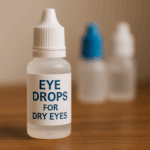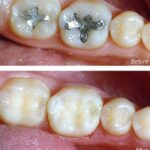At AskDoctor.ai, we know that many people struggle with unexplained anxiety, low energy, or mood changes without realizing the cause could be something as simple as a vitamin deficiency. That’s why we’ve put together this content to help you spot the signs, learn which vitamins matter most, and take simple steps to start feeling like yourself again
4 Key vitamins for depression and anxiety: are you missing these vital nutrients?
Have you been feeling off lately — more tired than usual, anxious for no reason, or just not quite yourself? You’re not alone. Many people think they’re just stressed, burned out, or getting older. But the real problem might be something much simpler… and easier to fix.
It could be a vitamin deficiency.
Yes, a lack of certain vitamins in your body can mess with your mood, energy, sleep, and even cause symptoms like anxiety or depression. And most people don’t even know it’s happening to them.
Let’s break down what’s going on, and how you can feel better — maybe even fast.
Why Vitamins Matter for Your Mood
Your brain needs vitamins to work properly. These nutrients help make chemicals like serotonin and dopamine — the ones that help you feel happy, calm, focused, and stable.
If your body doesn’t have the vitamins it needs, those chemicals don’t get made the way they should. That’s when things can start to feel off:
- You’re always tired
- You feel nervous or sad for no clear reason
- You can’t focus
- You feel “blah” all the time
It’s not all in your head — it’s in your body too.
These Are the Vitamins You Could Be Low In
Let’s talk about the main vitamins and nutrients that affect your mood — and what can happen if your body is facing vitamin deficiency.
1. Vitamin B12 – Energy and Brain Function
This one is super important. Vitamin B12 helps keep your brain, nerves, and energy levels strong.
If you don’t have enough B12, you might feel:
- Tired all the time
- Forgetful
- Numbness or tingling in hands and feet
- Low or anxious for no clear reason
Older adults, vegans, vegetarians, and people with stomach problems often don’t get enough B12. According to Harvard Health, up to 20% of people over age 60 may be B12 deficient.
2. Vitamin D – The Sunshine Vitamin
Vitamin D helps your brain and body stay balanced. It comes mostly from sunlight, so if you spend most of your time indoors (or live in a place with long winters), you could be running low.
Signs of low vitamin D:
- Feeling down or depressed
- Always tired
- Achy or weak muscles
A study found that people low in vitamin D are more likely to feel depressed.
3. Vitamin B6 – For Mood and Sleep
B6 helps your body make serotonin and dopamine. If you have B6 vitamin deficiency, you may notice:
- Mood swings
- Anxiety
- Trouble sleeping
- Feeling snappy or sad
People with poor diets or certain health conditions (like kidney problems) are more likely to be low on B6.
4. Folate (Vitamin B9) – Brain Support
Folate helps your brain and nervous system work right. If you’re low on folate, you may feel tired, low, or even have trouble thinking clearly.
It’s found in leafy greens, beans, citrus fruits, and some cereals.
5. Magnesium – The Calm Mineral
Not a vitamin, but still really important. Magnesium helps calm your nerves, relax your muscles, and support good sleep.
If you’re low on magnesium, you might feel:
- Jumpy or anxious
- Tense
- Restless at night
Nearly half of Americans aren’t getting enough magnesium from food, says Cleveland Clinic.
Askdoctor.ai also have a session that covers supplements for autoimmune support, if you have an autoimmune disease, the Best Supplements for Autoimmune Support article might be helpful.
How Charlotte Found Out Her Anxiety Was Caused by a Vitamin Deficiency
Charlotte, a young woman from the UK, spent years battling anxiety and depression. She tried therapy and medication, but nothing really helped.
One day, her doctor recommended testing her vitamin levels. It turned out she had a vitamin deficiency. She was low in B12, but after starting B12 injections, her energy returned. Her anxiety eased, and for the first time in a long while, she started feeling truly good again.
You can watch her story here: Charlotte’s Journey – YouTube
Could You Be Having Vitamin Deficiency?
It’s possible — especially if you’ve had these symptoms for weeks or months:
- Feeling sad, tired, or moody
- Brain fog or forgetfulness
- Weakness or tingling in your hands and feet
- No energy
- Trouble focusing
Many people don’t realize what’s going on until they get a simple blood test. If any of this sounds familiar, it might be time to ask your doctor to check your levels.
Easy Ways to Get the Vitamins You Need
You don’t always need pills for vitamin deficiency, a lot can be done through food and small changes.
Eat the Right Foods:
- B12: eggs, meat, dairy, fish, fortified cereals
- Vitamin D: salmon, tuna, eggs, fortified milk or juice
- Folate: spinach, beans, oranges, lentils
- B6: bananas, chicken, potatoes, chickpeas
- Magnesium: nuts, seeds, leafy greens, dark chocolate
Get Outside More
Spend at least 15 minutes in the sun every day (without sunscreen) if you can. That helps your body make vitamin D naturally.
Take Supplements (If Needed)
If your levels are really low, your doctor might suggest supplements or even shots (like for B12). Don’t guess — get tested first.
How Long Until You Feel Better After Vitamin Deficiency?
Some people notice a difference within a week or two — especially with B12 or magnesium. Others take a bit longer. It depends on how low your levels were and how your body responds.
If you’ve been feeling anxious, down, or “not yourself,” it doesn’t always mean something is wrong with your mind. Sometimes, it’s just your body telling you it needs help.
The good news is that vitamin deficiencies are easy to check and often simple to treat. So if you’ve tried everything else and still feel off, maybe it’s time to check your vitamin levels.
Final Thoughts: Don’t Ignore What Your Body Is Telling You
If you’ve been feeling low and can’t figure out why, don’t just chalk it up to “a rough patch.” Your body may be sending signals that something’s missing. The right vitamins can make a huge difference in your mood, energy, and overall mental health.
A simple blood test and some small changes to your routine could be the answer you’ve been looking for.
Have you ever found out you were low on a vitamin and felt better after fixing it? Or maybe you’re just starting your journey now. We’d love to hear your story — share in the comments and help someone else who might be struggling.
References:
Harvard Health
Mayo Clinic
Cleveland Clinic
PubMed Central (NIH)
Quick FAQs About Vitamins and Mood
- Can a Vitamin Deficiency Cause Anxiety or Depression?
Yes, if you don’t get enough vitamins like B12, D, or B6, it can affect your mood and make you feel anxious or sad. - Which Vitamins Should I Check If I Feel Anxious or Low?
You should check vitamin B12, vitamin D, folate (B9), vitamin B6, and magnesium — these are important for your mood and energy. - How Can I Tell If I’m Low on These Vitamins?
Signs include feeling tired, moody, forgetful, or having tingling in your hands or feet. A simple blood test from your doctor can tell for sure. - Can I Fix Vitamin Deficiency by Eating Healthy?
Eating foods rich in these vitamins and getting some sunlight can help. But if your levels are very low, you might need supplements or shots. - How Soon Will I Feel Better After Taking Vitamins?
Some people start feeling better in 1 or 2 weeks, but it can take longer depending on how low the vitamin levels were.









Leave a Reply